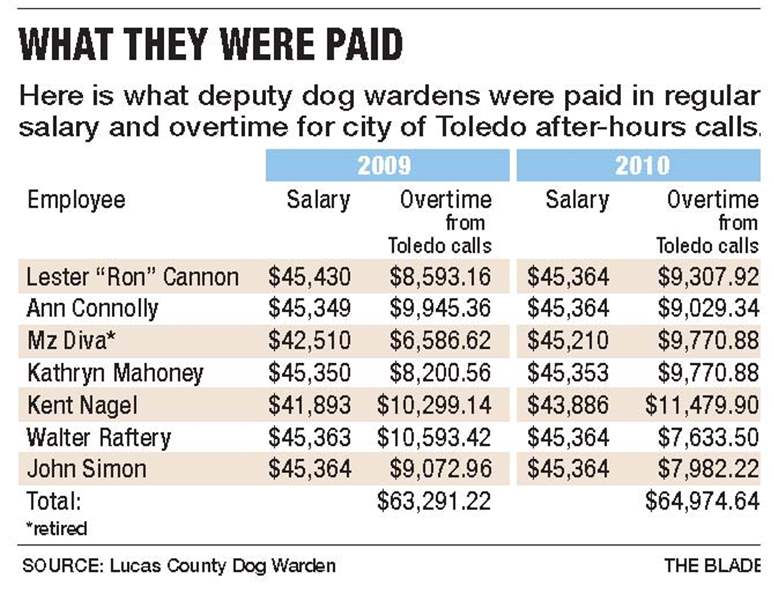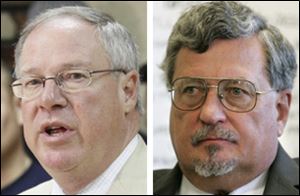
AFTER-HOURS COSTS ADD UP
Dog warden deputies paid $91,027 for night calls
City of Toledo seeks contract relief from overtime, expenses
6/30/2011

Councilman D. Michael Collins, left, and Deputy Mayor Steve Herwat said the city wants costs cut.
Lucas County deputy dog wardens have raked in so much overtime catching dogs in Toledo that city officials are now questioning why the bill is so high.
The answer seems to be the way dog pound employees are paid for "after-hour" calls.
The city and county are at an apparent impasse over a new contract for dog warden services. A proposed contract calls for the city to pay $155 for each after-hour call made Monday through Saturday and $205 a call on Sundays and holidays -- plus a $20,000 "stand-by fee," up from the $8,300 fee in the 2010 contract.
The six deputy dog wardens who alternate on-call duty for the city get paid four hours of overtime pay for Monday through Saturday calls and four hours of double time for Sundays and holiday calls.
In 2010, the city of Toledo paid $91,027 for night call overtime, mileage, pension payments, taxes, and workers' compensation fees, according to records provided by the dog warden. The city is responsible for the additional compensation expenses -- not just the overtime itself.
Toledo Councilman D. Michael Collins Wednesday said he directed City Law Director Adam Loukx to renegotiate the contract so the regular hours of operation for dog-catching are extended to 11 p.m. instead of ending at 4 p.m.
"I told the law director to go back and negotiate any additional coverage to an expansion of the hours to 11 p.m., which means they will have an afternoon shift," Mr. Collins said.
"The terms and conditions of the contract are unacceptable," he said. "They are a law enforcement agency and I would expect that they should expand their times when the need is most necessary, which is between 4 p.m. and 11 p.m."
The deputy dog wardens are represented by AFSCME Local 544 and covered under a contract with the county.
Dog Warden Julie Lyle said the contract sets the four-hour, call-back rate they are paid as well as prohibiting her from scheduling people after 4 p.m. for city calls.
She said the contract outlines the standby time, which means a deputy has to wear a pager and be on call -- something the employee also gets paid to do.
Toledo Deputy Mayor of Operations Steve Herwat said the city has asked to reduce the costs.
"We certainly have and the response we have gotten is they have certain provisions in their labor contracts and that we have to pay the cost," Mr. Herwat said. "We are certainly not pleased we have to pay those fees for night and overtime service, which is why we have to explore other options."
Mr. Herwat said county officials told him they would have to renegotiate the contract with Local 544 before the fee could be changed.

He also said the city in the future could hire its own animal control or "contract out for the service," but he said Mayor Mike Bell's administration and council will have to agree on a 2011 contract.
Commissioner Pete Gerken, a former United Auto Workers' official who approved the current labor contract with the dog warden employees' union, said the county has always tried to save the city money, including participating in a massive switch to privatized trash collection.
"[The four-hour fee] was not a point of negotiations with the city, who were purchasing the service," Mr. Gerken said. "I don't recall the city saying, 'Let's change the terms of this,' but I am always happy to work with the city to reduce their expenses."
Mr. Gerken said that kind of after-hours, call-back provision is not uncommon in union contracts.
"I do have a contract with the employees that runs until the end of the year that up until now, it was acceptable to the city," he said. "It was probably still cheaper for the city for this than if a police officer gets called out on overtime since their rates are higher."
Sally Powless, regional director of AFSCME Ohio Council 8 in northwest Ohio, who negotiated the contract for the union, said the call-back provision has existed in the contract for more than two decades.
"It is like inconvenience pay," Ms. Powless said. "You can't go to drink, or go to a show. You have to be available to take the call and go, so they cannot do normal things."
She assumed creating an afternoon shift or late-night shift would be cost-prohibitive, but didn't explain how assigning one deputy to a night shift would cost more than the $91,000 a year Toledo taxpayers alone are paying for the after-hours charges, not counting the additional fees charged to taxpayers in other suburban communities.
"A lot of times there are no calls, so you would be scheduling someone and there would be no work," Ms. Powless said. "You can't patrol around in the dark and [drive] around looking for dogs."
She also noted that the city can control the cost by not calling for a deputy dog warden to respond somewhere.
The same fees are paid by other communities that contract with the dog warden, including Sylvania, Sylvania Township, Waterville, and Oregon.
Last year, Sylvania paid $4,337.57 and Sylvania Township paid $4,360.68. Complete figures for Waterville and Oregon were not available.
Contact Ignazio Messina at: imessina@theblade.com or 419-724-6171.